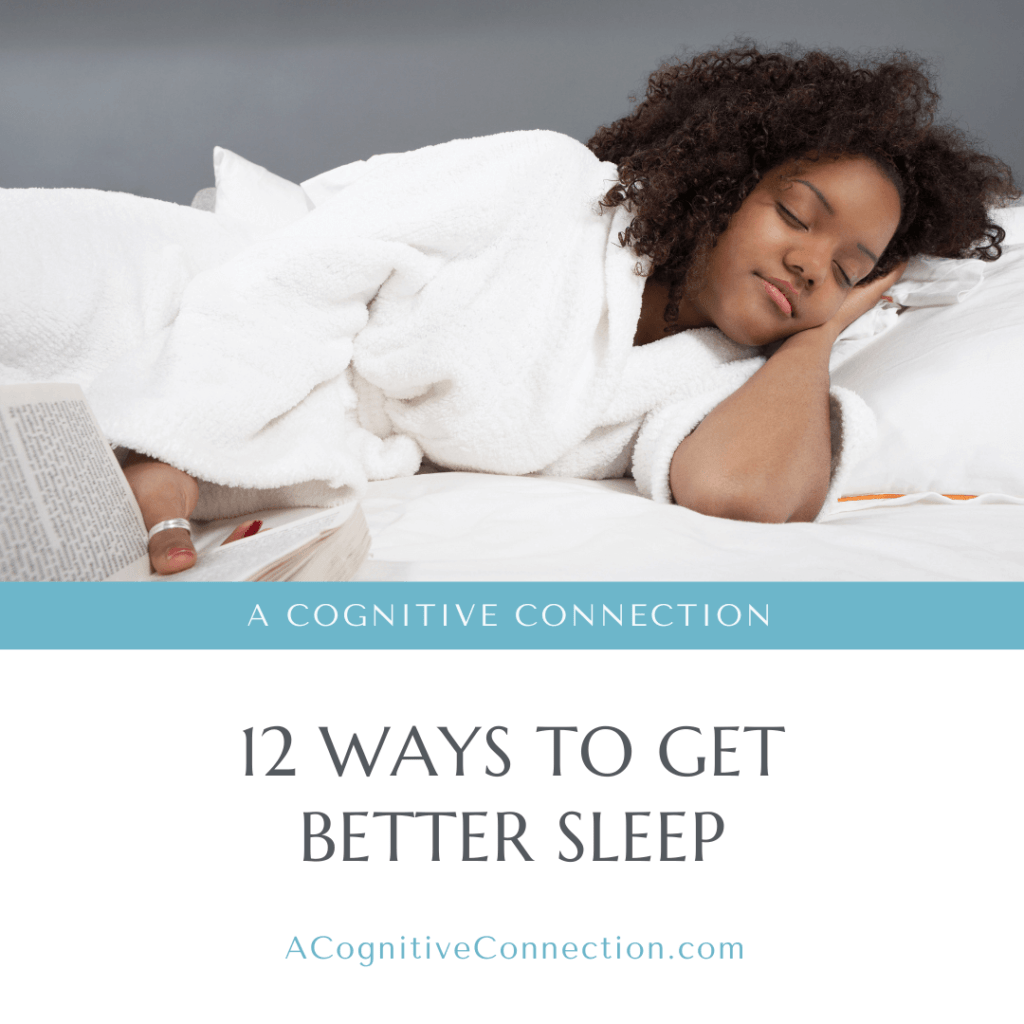Most of us don’t prioritize healthy sleep habits. For example, you probably know to go to bed at the same time every night, but you might be tempted to stay up late to finish a few chores or watch the next episode of your favorite show.
Unfortunately, when you don’t get enough quality sleep, it can affect your focus, memory, and even physical health. If you feel consistently tired, it might be time to make a lifestyle change. In this blog, we’ll cover what causes poor sleep and 12 ways to get better sleep starting tonight.
What Causes Poor Sleep?
Before we can take steps to improve our sleep, it’s helpful to understand why we’re currently not sleeping well. The main causes are:
- Stress: Stress can lead us to overthink and not allow our minds to shut off when it’s time for sleep.
- Lack of exercise: Too little physical activity throughout the day can cause us to become restless at night.
- Too much caffeine and alcohol: Coffee and alcohol act as stimulants, so they might be stopping our brains from reaching a deeper sleep level.
- Irregular bedtimes: When you go to bed at the same time every night, your body starts to recognize a pattern and release sleep hormones around that time. Irregular bedtimes prevent this from happening.
- Electronic devices: The blue light that screens emit at night has been known to mess with melatonin production – an important hormone for achieving restful nights.
Some sleep problems, like insomnia, can be caused by an underlying health condition. If the cause of your poor sleep isn’t obvious, you may want to schedule an appointment with your doctor. However, the rest of these sleep problems can be drastically improved by making a few small changes to your sleep habits.
Benefits of Better Sleep
So what could your life look like if you made these changes? For one, you’ll have more energy during the day to accomplish everything you need to do. You’ll also be in a better mood, and studies have shown that people who get enough sleep are less likely to suffer from depression.
Sleep is also important for your physical health. When you sleep, your body has a chance to repair any damage that was done during the day. Getting enough sleep can help improve your immune system, making you less likely to get sick. And if you’re already sick, sleeping can help you recover more quickly.
Lastly, sleep helps your brain stay cognitively healthy and build neural connections, which allows you to process what you learned throughout the day.
Tips for Better Sleep
1. Set a regular sleep/wake cycle that follows the same times every day.
Our bodies follow a 24-hour biological clock, which can also be called the circadian rhythm. Keeping your sleep schedule consistent reinforces your body’s natural rhythm, making it easier to fall asleep at night and wake up in the morning.
2. Create a dark environment.
Some people have no trouble falling asleep in bright environments, but for most of us, light triggers our bodies to prepare for the day. If your sleep environment is not as dark as you’d like, try investing in a sleep mask or blackout curtains. You’ll be amazed at the difference in your sleep quality.
3. Use white noise.
Try a “white noise” source. White noise can mask loud or irregular noises that may otherwise disrupt your sleep. White noise machines are available at many stores, are reasonably priced, and typically have multiple sound options.
Other white noise options include room-negative ion (ozone-free) air filters and humidifiers (very important in drier months). Or, if you like total quiet, earplugs may be right for you.
4. Unplug before bed.
Turn off the screen sources at least an hour before bedtime. Computers, TVs, phones, etc., all stimulate your sensory system. On many devices, you can set the lighting to dim from a specified time, such as 9:00 pm-7:00 am. Or install f.lux on your computer or other devices, and you can have your TV brightness settings adjusted automatically.
If you’re looking for a calming evening activity that won’t interfere with your sleep, try reading, listening to relaxing music, taking a shower, or meditating.
What can you integrate into your pre-bedtime routine to help you reduce stress and prepare for sleep?
5. Exercise throughout the day.
You don’t need to go crazy with this, but 30-45 minutes per day of light cardiovascular exercise (like brisk walking) can help improve your sleep. Be sure that you are doing this exercise during the daytime, as exercising right before bedtime might give you energy instead of calming you down.
6. Invest in good bedding, pillows, and a quality mattress.
Find a bed and pillow firmness that feels great to you, and cover it in clean, comfortable sheets. Seeing what bedding works best for you may take time and experimentation. Also, just because you like a softer mattress doesn’t mean you’re sleeping partner does. Consider separate firmness levels on each side or even separate twin mattresses pushed together to make a king-size.
7. Consider organic bedding.
This is a new concept for most people, but one that is important with the increasing toxin and chemical exposure in our daily lives. Modern foam bedding is often treated with flame-retardant sprays. This combination of the foam/synthetic material and flame-retardant can cause “off-gassing” throughout the night and be challenging for people with chemical sensitivities.
If you recently purchased a new mattress and realize that your sleep is worse than before, consider both the firmness and what the mattress contains. Lastly, when buying mattresses for children, invest in an organic mattress and wool mattress cover, as their immature systems are very easily overburdened.
8. Check your diet for gluten & casein sensitivities.
Gluten
Gluten is a protein found in grains, wheat, rye, barley, spelt, and some oats. Gluten is also very prevalent in prepared foods. Gluten can cause challenges for our intestines; about 6% of the U.S. population is gluten intolerant. Since 80% of our immune system begins with our nasal and mouth mucus membranes/lymphatic tissues (i.e., tonsils) and continues through our entire 30 feet of intestines, a challenged GI tract can cause immune system issues.
Immune challenges are a stressor on our nervous system. Stress on our nervous system contributes to suboptimal sleep. Gluten can also inhibit an enzyme called glutamic acid decarboxylase, or GAD. The job of GAD is to convert glutamate to GABA (the most powerful calming neurotransmitter in the brain). So, if your gluten sensitivity “turns off” or down-regulates your GAD enzyme, you end up with lots of glutamates and not as much GABA, and you feel overstimulated.
Many people have eliminated gluten from their diets and reported improved sleep, mood, and metabolism due to less inflammation and better glutamate-to-GABA conversion.
Casein
Casein is a protein found in cow, sheep, and goat milk, though it is most prevalent in cow’s milk. Again, many prepared foods in our daily diet contain casein, caseinate, milk powder, etc., because it makes food creamy and tasty.
Suppose you are sensitive to casein and the other portions of animal milk and you eat/drink dairy products. In that case, you may notice congestion, sinusitis, chronic sinus infections, tonsillitis, chronic post-nasal drip, poor GI function, gas and bloating, etc. Inflamed nasal and throat passages can contribute to snoring as well as obstructive apnea, resulting in poor sleep patterns and daytime fatigue.
9. Limit caffeine & alcohol.
Caffeine, a stimulant, and alcohol, a depressant, are not a problem for everyone. However, caffeine should be consumed in moderation, followed by a tall glass of water, and not consumed 6 hours before bedtime.
Alcohol should also be consumed in moderation and always followed by a tall glass of water. Although it acts as a depressant to the nervous system, it is short-lived. Alcohol may help us fall asleep, but then typically makes the second half of the night less restful. It is best to consume alcohol with dinner and not directly before bedtime. This allows time for your liver to process the alcohol and the adverse neurologic effects on sleep to be lessened.
10. Stay hydrated.
Stay hydrated during the day. Recognize that it is normal and okay to get up and use the restroom 1-2 times/night if you are well hydrated. That being said, you may want to add in Himalayan pink salt or REAL salt as that will help your body better use water and may prevent some of the bathroom sleep interruptions.
Your goal for hydration is to drink half your body weight in ounces of clean, filtered water. An easy way to check hydration is by urine color. Clear or light yellow is good. Dark yellow means you are already dehydrated.
11. Take advantage of the 90-minute sleep cycle trick.
We sleep in cycles that last between 90-110 minutes. During that time, we should move through 5 stages of sleep and return to consciousness. Take advantage of this knowledge when choosing a wake-up time so you wake up at the end of a sleep cycle.
For example, five 90-minute sleep cycles would last 7.5 hours, so if you go to bed at 11 pm, set your alarm for 6:30 am.
12. The power of neurotransmitters and hormones.
Have your neurotransmitters, stress hormones, and sex hormones checked by a well-trained practitioner who practices a c integrative approach to optimal health. These metabolic chemicals create a symphony of interactions that, when optimized, help us move through stressful emotional, cognitive, and physical situations with relative ease.
Neurotransmitters are very involved in the subtle balance between sleep and wake cycles, according to a 2005 article by Clifford Saper et al.
Elevated stress hormone cortisol at bedtime can make falling asleep challenging. Depleted sleep hormone melatonin also makes falling asleep difficult. The majority (>90%) of your body’s serotonin is made in the intestines, so take good care of them with your diet, and serotonin is implicated in poor moods and difficulty staying asleep.
Research demonstrates that if you are depressed, you don’t sleep well; conversely, if you don’t, you are prone to depression.
So, how is your serotonin level? And more importantly, how are all of your neurotransmitters and stress/sleep/sex hormones looking? They are all attendees at the same dance, and we need all of them to be optimized for a healthy brain.


